
The e-commerce industry is a dynamic and ever-evolving landscape, characterized by rapid technological advancements and changing consumer behaviors. For entrepreneurs in this space, staying abreast of emerging trends is not just beneficial; it’s essential for maintaining a competitive edge. This article explores the latest trends shaping the future of e-commerce and provides insights on how entrepreneurs can adapt to these changes to stay ahead in the game.
The Rise of Augmented Reality in E-Commerce
Augmented Reality (AR) is revolutionizing the online shopping experience by bridging the gap between digital and physical worlds. AR allows customers to visualize products in their own environment before making a purchase, thereby enhancing decision-making and reducing return rates. Businesses are increasingly implementing AR to provide immersive shopping experiences. For instance, furniture retailers use AR to enable customers to see how a piece of furniture would look in their room, significantly impacting customer engagement and increasing sales.
The integration of AR into e-commerce platforms is not just a novelty; it’s becoming a necessity. It caters to the modern consumer’s desire for interactive and personalized shopping experiences, setting a new standard in online retail.
The Emergence of Voice Commerce
Voice commerce, powered by AI assistants like Alexa and Google Assistant, is transforming the way consumers shop online. The convenience of shopping through voice-activated commands is appealing to a growing number of consumers. This trend is not just reshaping the shopping experience but also how e-commerce sites are optimized.
To leverage the potential of voice commerce, businesses need to optimize their e-commerce sites for voice search, focusing on natural language and conversational queries. The rise of voice commerce represents a shift towards more intuitive and user-friendly shopping experiences, signaling a future where voice-activated shopping becomes a norm.
Personalization and Customer Experience
Personalization is becoming a cornerstone of the e-commerce experience. Tailored product recommendations and customized shopping experiences are no longer a luxury but an expectation among consumers. This trend is driven by technologies like AI and machine learning, which analyze customer data to deliver highly personalized experiences.
Personalized experiences not only enhance customer satisfaction but also foster loyalty and repeat business. E-commerce businesses leveraging personalization see increased engagement, higher conversion rates, and a significant boost in customer loyalty. In a crowded online marketplace, personalization is a key differentiator.
Mobile Commerce and Social Media Integration
The integration of mobile commerce and social media is reshaping the e-commerce landscape. With an increasing number of consumers shopping via mobile devices and social platforms, businesses must prioritize mobile optimization and social media integration. This includes responsive website design, seamless mobile payment options, and shoppable posts on social media platforms.
Leveraging these platforms effectively is crucial for reaching wider audiences, driving sales, and enhancing brand awareness. The convergence of social media and e-commerce provides businesses with innovative ways to engage with customers and capitalize on impulse buying behaviors.
Sustainability and Ethical Practices
Sustainability and ethical practices are becoming increasingly important in the e-commerce sector. Consumers are more conscious of the environmental and ethical implications of their purchases, driving demand for sustainable and ethically produced products. Businesses adopting sustainable practices not only contribute to environmental conservation but also enhance their brand image and build customer loyalty.
This shift towards sustainability requires businesses to rethink their supply chains, packaging, and product sourcing. Incorporating sustainability into business practices is not just a moral obligation but a strategic business move in response to consumer trends.
Preparing for the Future
Adapting to these emerging trends is crucial for e-commerce entrepreneurs looking to succeed in the future marketplace. Staying informed, embracing innovation, and being agile in business strategies are key to navigating the rapidly changing e-commerce landscape. Entrepreneurs should focus on continuous learning, experimenting with new technologies, and adapting to changing consumer preferences.
The ability to quickly adapt to new trends and technologies will distinguish successful e-commerce businesses from the rest. Entrepreneurs must be proactive in their approach, constantly seeking ways to enhance the customer experience and stay ahead of the curve.
Conclusion
The future of e-commerce is marked by exciting trends such as augmented reality, voice commerce, personalization, mobile and social media integration, and a growing focus on sustainability. These trends present tremendous opportunities for e-commerce entrepreneurs to innovate, differentiate, and grow their businesses.
Embracing these trends and preparing for future developments will be crucial for success in the evolving world of online shopping. The future of e-commerce is bright, and for entrepreneurs who are ready to adapt and innovate, it holds limitless potential.



Leave a Reply